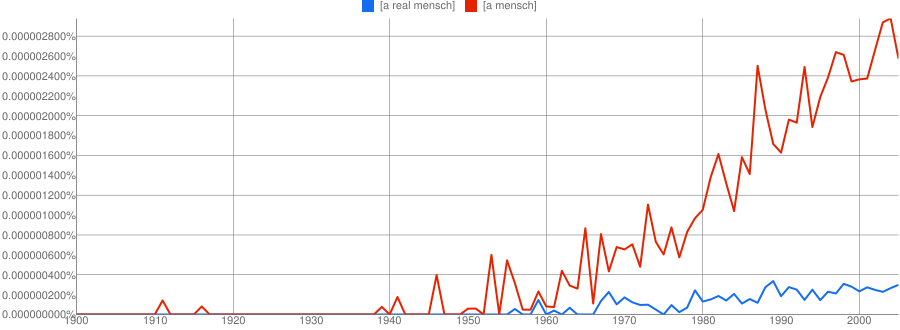I didn't become familiar with the term mensch until the 1970s, when I moved from Texas to the east coast (Maryland) for college. At the time I assumed that it was simply a regional term. However, the frequency of "a mensch" in Google Books search results suggests that the term's popularity in published writings has grown substantially since the 1950s. Here is the Ngram chart for "a mensch" (red line) and for "a real mensch" (blue line) for the period 1900–2005:

The Ngram results suggest that few occurrences of "a mensch" appeared in print prior to 1960—and indeed Google Books search results find no instances of "a mensch" as a Yiddish expression in an English-language text until the two that appear in the 1950s. The first occurrence is from Ignaz Maybaum, The Jewish Mission (1951):
Geiger's humanist imperative "Sei ein Mensch" (be truly human) meant what Mensch meant in the German language of the eleventh century, and what has been kept alive until to-day in the Yiddish word "Mensch". But the nineteenth-century German language derived the word Mensch from the enlightenment age which saw man only as homo sapiens and not as the child of God. To be a Mensch meant to Geiger to be merciful. Geiger's Jewish humanism is expressed in Micah's words: "It hath been told thee, O man, what is good, And what the Lord doth require of thee: Only to do justly, and to love mercy, and to walk humbly with thy God" (VI, 8).
The second instance is from Philip Roth, "Epstein," in Goodbye Columbus: And Five Short Stories (1959):
Epstein opened his mouth. His tongue hung over his teeth like a dead snake.
"Don't you talk," his wife said. "Don't you worry about anything. Not even the business. That';; work out. Our Sheila will marry Marvin and that'll be that. You won't have to sell, Lou, it'll be in the family. You can retire, rest, and Marvin can take over. He's a smart boy, Marvin, a mensch."
Lou rolled his eyes in his head.
More than a dozen Google Books matches for mensch appear in English-language sources during the 1960s, and the numbers have continued to increase sharply in the decades since then.
Another measure of the increasing awareness (in U.S. English) of mensch is its inclusion, since the Ninth Collegiate (1983) in the Merriam-Webster's Collegiate Dictionary series. This is significant because these dictionaries are by no means exhaustive in their inclusion either of new terms or of terms that are infrequently used. The Ninth Collegiate gives a surprisingly late first-occurrence date for the word in English:
mensch n {Yiddish, fr. G, man, human being, fr OHG mennisco; akin to ON mennska humanity} (1953) : a person of integrity and honor
But just as unexpectedly, the Eleventh Collegiate (2003), while retaining the Ninth Collegiate's etymology and definition, bumps back the first occurrence date almost a hundred years, to 1856.
In my view, mensch is rapidly becoming Americanized, which means that the advice to "act like a mensch" is more and more likely to be understood in parts of the United Sates outside its traditional strongholds of the Northeast and big cities. Hence we get un-self-conscious article ledes like this one from David Greenberg, "It's a Myth That Nixon Acquiesced in 1960" in the Los Angeles Times (November 10, 2000):
Despite thousands of contested ballots in Florida's Palm Beach County, a lot of people are calling on Al Gore to act like a mensch and concede the election to George W. Bush—as they contend Richard M. Nixon did in 1960 when he lost to John F. Kennedy amid rumors of fraud.
Many newspapers far from Los Angeles are signed up to share stories from the L.A. Times, so a story like this one is apt to be read by people in many parts of the country, exposing them to the phrase "act like a mensch."
Nevertheless, on the strength of other responses to this question, I would caution you not to expect mensch to travel well outside the United States into other parts of the English-speaking world.
UPDATE (11/26, 2016)
Early instances of 'a mensch' in English-language newspapers
I decided to supplement my original, Google Books–based answer with some research into early instances of "a mensch" from newspapers, using an Elephind search for that phrase. By far the earliest match for "a mensch" is from "Obituary: Felo de Se" in the [Lehighton, Pennsylvania] Carbon Advocate (April 28, 1877), a strangely jocular account of a suicide:
--"Who would ——— bear to grunt and sweat under a weary life, when he might his quietu make with a bare bodkin?" Such, probably, were the thoughts of Sebastian Mensch, of East Mauch Chunk, as he hurriedly left the breakfast table on last Saturday morning; only that he applied the muzzle of a gun to his mouth instead of driving the blade into his bosom. The effect was the same however, for within a few minutes from the time he had left the room, Sebastian had ceased to be a "Mensch." What beliefs he had, we know not, but suppose that, wearied and disgusted with life, he concluded that it were best for him his "quietus to make."He now sleeps the last sleep beneath the clods of the valley, in anticipation, let us hope of a brighter future. The cause and mode of his exit will, we hope be an admonition to others never to indulge in excess, nor to attempt the swallowing of a loaded gun. Requiescat in pace.
East Mauch Chunk is a real place, in the Lehigh Valley of Pennsylvania, which is a heavily ethnic German area. The "ceased to be a 'Mensch'" remark in the story arises only because of the dead man's name—but it seems clearly to be a play on the word mensch. The next four occurrences of mensch (ranging across a period from 1908 through 1955) are from a Jewish newspaper in Sydney, Australia and from two newspapers in New York City
From Nahum Sokolow, "Aron Ber, The Terrorist" in the [Sydney, New South Wales] Hebrew Standard of Australasia August 28, 1908):
He has no definite duties, The other work people know what they are. The workmen are workmen; the office staff are bookkeepers, superintendents, porters and salesmen. Old Aron Ber is nothing of all that. He merely—a Mensch. In earlier years he had to look after the potatoes from which the jam was partly made. He used to ride to the starch factories and buy potato refuse. But this duty was taken from him many years ago and given to a younger, man.
From Montague Glass, "Capture Villa? Stop Talking Nonsense," in the New York Tribune (May 14, 1916):
President Wilson is like a whole lot of fellers. He starts in with good cards and instead of playing them like a Mensch, y'understand, he considers first should he come trump, y'understand, and he's got his thumb and finger on the ace of trump, when he thinks why should he give his hand away like that.
From "Amusing Anecdotes of Jewish Life," in the [Sydney, New South Wales] Hebrew Standard of Australasia (June 29, 1923):
"What I have written," said the Gaon, "is absolutely true, but I'm afraid you've taken the wrong meaning out of it. What I meant was that he knows as much Hebrew as Shakespeare, that he knows as much English as Moses, and that as the Almighty is not a mensch, neither is this Rav a Mensch."
From E. Hemingin, "Lion at Large: The Importance of Being Earnest," in the [New York City] Columbia [University] Daily Spectator (December 7, 1955):
Carrying 19½ points, while not conducive to a great average, makes one feel for the first time martyr-like, courageous—in short, "a mensch."
The next-earliest match, from "Writer Predicts, Revolt Will Go On," in the [Kent, Ohio] Daily Kent Stater (January 16, 1969) is the first Elephind instance of mensch to appear in the U.S. midwest:
"The more self-education, the more a student will find and test his capacities and real interests until, on graduation, he Is a "mensch" (man), rather than a narrowly trained, stunted professional ready to be slotted Into his 'place' in the structure of what SDS calls corporate liberalism," Hentoff asserted.
"Hentoff" is Nat Hentoff, a longtime writer for the [New York City] Village Voice, although the quotation here comes from an article titled "The Universities: Crisis of Legitimacy," published in the January 1969 Evergreen Review. This instance (published about 16 months before the Ohio National Guard's shooting of protesting Kent State University students) is noteworthy in part because it indicates that the editor at a college newspaper in a small city in northeastern Ohio in 1969 deemed it necessary to translate mensch for readers.
Likewise, Willard Abraham, "Parents Are Children's Most Important Teachers," in the [Sachse, Texas] Sentinel (February 24, 1988) includes a definition of mensch:
Serious thinkers have sometimes written about this issue. A recent one is Rabbi Neil Kurshan whose book is titled "Raising Your Child to be a Mensch." There is no direct translation of that word, but in a description of the book it is stated that "the term reflects a social ideal of traditional culture, representing decency, generosity, kindness and above all — integrity."
The same perceived need for translation may be true (albeit with a somewhat patronizing inflection) of this instance from Dan Sorid, "The Lion's Den: Columbia as Sketchy Friend: Half-Truths and Betrayal,"in the [New York City] Columbia [University] Daily Spectator (January 19, 1999):
And now for the weekly Morningside Mensch and Moron Awards. (Note for the Goyim: a mensch, according to "The Joys of Yiddish," is someone with "nothing less than—character: rectitude, dignity, a sense of what is right, responsible, decorous.")
But in a letter from Sid Herzig to the editor of the [Ithaca, New York] Ithacan (April 4, 1969), the writer feels no need to explain the term:
In the Community Model [of campus life] priorities are established and resources are allocated democratically. Trustees, administrators, faculty members, and students share educational values including respect for individual differences. Ideally individuals grow and develop in an open pluralistic society. The good life is a community of mensch.
Ultimately, although the newspaper matches noted here show that mensch has sporadically been used in English-language contexts for considerably longer than my Google Books search results might suggest, they don't indicate widespread U.S. awareness of the term even as late as 1999.


